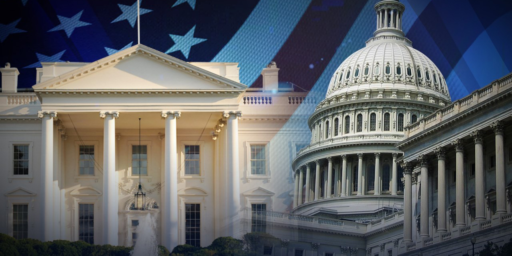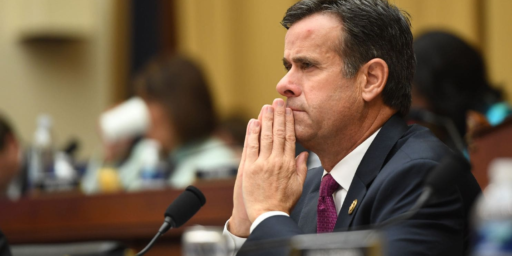Why Didn’t Bush Ask Congress?
George Will asks a question that has surely occured to most of us: Why didn’t President Bush ask Congress to expand his authority to conduct domestic spying, removing all doubt as to whether he had the authority?
Without more information than can be publicly available concerning threats from enemies operating in America, the executive branch deserves considerable discretion in combating terrorist conspiracies utilizing new technologies such as cell phones and the Internet. In September 2001 the president surely had sound reasons for desiring the surveillance capabilities at issue.
But did he have sound reasons for seizing them while giving only minimal information to, and having no formal complicity with, Congress? Perhaps. But Congress, if asked, almost certainly would have made such modifications of law as the president’s plans required. Courts, too, would have been compliant. After all, on Sept. 14, 2001, Congress had unanimously declared that “the president has authority under the Constitution to take action to deter and prevent acts of international terrorism,” and had authorized “all necessary and appropriate force” against those involved in 9/11 or threatening future attacks.
[…]
On the assumption that Congress or a court would have been cooperative in September 2001, and that the cooperation could have kept necessary actions clearly lawful without conferring any benefit on the nation’s enemies, the president’s decision to authorize NSA’s surveillance without the complicity of a court or Congress was a mistake. Perhaps one caused by this administration’s almost metabolic urge to keep Congress unnecessarily distant and hence disgruntled.
Charles de Gaulle, a profound conservative, said of another such, Otto von Bismarck — de Gaulle was thinking of Bismarck not pressing his advantage in 1870 in the Franco-Prussian War — that genius sometimes consists of knowing when to stop. In peace and in war, but especially in the latter, presidents have pressed their institutional advantages to expand their powers to act without Congress. This president might look for occasions to stop pressing.
Will’s recommendation contains the answer, really: Presidents presume they have the power to act in the defense of the national security and are loathe to ask the permission of Congress by institutional reflex. This instinct has been reinforced in recent years because presidents have been given good reason not to trust Congress not to go public.
Further, as Tom Maguire documents extensively, the relevant congressional oversight committees and the leadership (including then-Majority Leader Tom Daschle) were briefed extensively and repeatedly, apparently with no great fuss made.
Veteran intelligence officer Emily Francona goes further:
Whether the President acted under proper executive authority will undoubtedly be determined during hearings of the Senate Judiciary Committee. But he did follow requirements for legal review of his orders by consulting with the NSA Legal Counsel and the U.S. Attorney General.
He also followed congressional oversight requirements by notifying the appropriate congressional committees in a timely manner. And it is customary for more sensitive activities to be briefed only to a limited number of senior oversight committee members to avoid leaks of classified national security information. Our current system of checks & balances does not require congressional oversight committees to approve intelligence activities in advance, only that they be notified of significant activities in a timely manner.
That all said, Will’s instincts are correct. Presidents should press their institutional prerogatives less and seek more cooperation from Congress. He’s almost certainly right that, in the aftermath of 9/11, Bush could have gotten virtually anything he wanted from Congress in the name of fighting terrorists.
The administration’s playing it close to the vest vis-a-vis Congress and the FISA court judges may be a case of executive hubris. We don’t know for sure, and may never know, because the details of the program itself are quite murky.





This is why.
http://www.opinionjournal.com/editorial/feature.html?id=110007703
Would you TRUST the entire bunch of “Blabber Mouths” sitting in the US House of Represenatives and the Semate”
Every one of these blow hards would do and/or say anything for a headline or a vote.
If anyone is to be impeached, It should be everyone of these so called “represenatives”.
I am sick of the whole bunch of them. They are all liars and cheats. Sad part is that so many think they are Gods gift to mankind and they themselves are the law and above the law.
Most of them couldn’t pour pee out of a boot with instructions writen on the heal.
And when “glorious leader” decides that we need to register all guns to help fight the war on terror you will go along with this also? It’s sad to see what the republican party has become.
Today the liberal sector of congress asserts they were deceived into believing WMD. As such, why would they not be “upset” with and/or attempting to terminate every executive authority granted?
When did the Clinton administration request the same?
The Jihadist enemy with whom we are at war seeks to kill everyone in America. President Bush’s goal is to prevent that. The liberals in unified force have voted out the Patriot Act. Who do they feel will best protect America?
Regarding Tom Daschle, recently in the Center for American Progress,
This is in the end a war against Bush.
JDW
None:
Don’t tell me, I already know why your eyeballs are brown.
Herb, they’re green. Probably with envy of your sublime wit.
None:
Thanks for the compliment. But you are still a none (0)